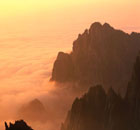





-
-
TagsLindsay Lohan,Britney Spears,Robert Pattinson,Zac Efron,Brad Pitt,Tom Cruise,Jessica Alba,Jennifer Aniston,Kristen Stewart,Angelina Jolie
Seal-cutter's art
Fei Mingyao, a well-known Chinese seal-cutting artist from Shanghai, has published a collection of signature works.
Japan's lady with the lamp
Kyoko Nakamura has two sets of clothes neatly arranged in her closet. One is a Japanese kimono, the only present from her mother; the other is an Eighth Route Army uniform that she wore more than 60 years ago.
Climbing out of the ant hill
The small village Tangjialing, located 20 km from the downtown area in Haidian district, is home to about 20,000 low-income college graduates - a demographic one sociologist likens to ants.
Dadawa's going places
When Dadawa first went to Tibet autonomous region in 1994 she was unimpressed by the potholed roads and lack of electricity, but the magical land nevertheless fascinated the Guanghzou girl.
Floating like a butterfly
Like many other young girls who love singing and dancing, Zhou Peng was excited to appear on television when she won a national singing competition in 1999 at 16. Then she released an album that sold well and became known as "China's first dance music singer".
Back to basics
She aims to make it a low-carbon village by constructing environmentally friendly houses and developing a sustainable local economy to enable the villagers to live in harmony with each other and the environment.
Inspired granddaughter gives charity a hand
This year holds special significance for a special person - Yang Yang, granddaughter of late Chinese leader Deng Xiaoping.
The stuff of dreams
If someone had told him two months ago that science could be as fun as animation, Pu Kaiji - an art and design student of Nanjing's Southeast University - would have laughed.
Power to the people
Beijing residents have been baking under a hot sun for weeks now, but there are no signs that any respite is on the horizon.
Molding dreams
In 1995, Jingdezhen's kilns started shifting from coal to gas. In two years, the city dismantled and reconstructed more than 190 coal kilns and demolished most of the chimneys.
Salt of the Earth
During our recent trip to Shaanxi province, we were amazed by the improved living conditions in the countryside.
Good vs evil
In the eyes of Professor Hans Kueng, Chinese culture is the "longest surviving high culture in the world".
Soldiers of truth
China hands are in demand today in the United States, with relations between the two countries becoming entwined ever tighter.
Putting nations in perspective
John Keay says when he was asked to write a major history of China he thought the idea was absurd and told his publisher this. "I said I didn't speak a word of Chinese and Chinese history is impenetrable to Western audiences.








